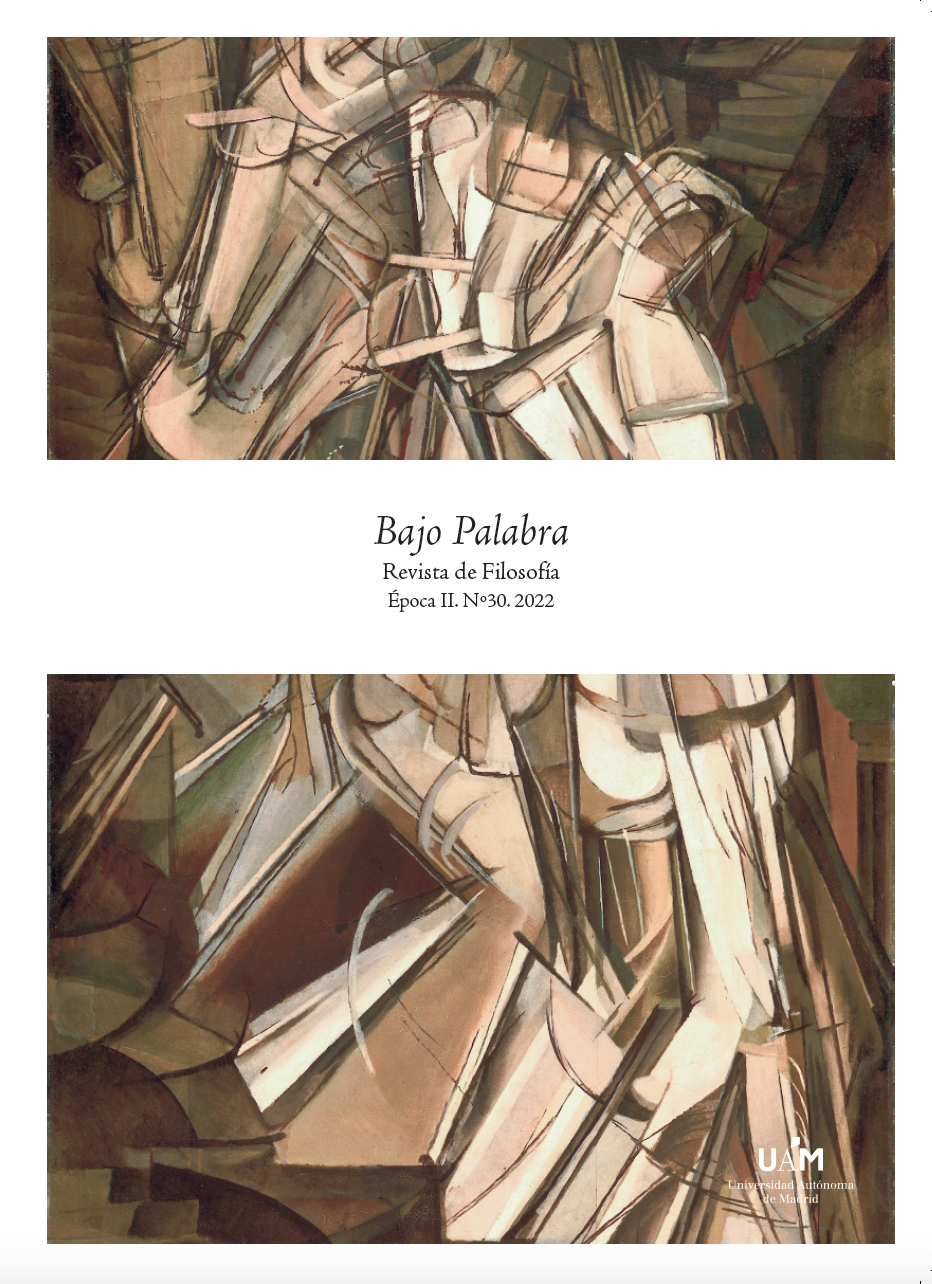Keywords:
Intuition, Disagreement, Skepticism, Rationalism, Fake newCopyright (c) 2022 Rafael Miranda – Rojas

This work is licensed under a Creative Commons Attribution 4.0 International License.
Abstract
The last ten years have seen an increase in
the discussion regarding what methodology
is developed in the philosophical field, and
what are the implications of developing such
diverse theoretical positions that allow philosophical
disagreement to be maintained as a
constant: agreeing to disagree comes dangerously
close to making the search for reasons
for certain theoretical positions trivial. This
is the context of the recent contributions collected
in D’Oro & Overgaard (Eds.) (2017),
from which we try not necessarily to initiate
a dialogue between different philosophical
paradigms, but rather to make explicit their
differences and similarities. The present paper
aims to analyze the theoretical inputs on
the methodological role of intuitions in the
philosophical field, specifically on the topic
of epistemic disagreement. An optimistic
perspective of this disagreement is proposed,
following Cappelen (2017) and Ichikawa
(2016). In particular, an attempt is made to
try to answer the question of whether the
persistence of disagreement constitutes a reason
to rule out that there is philosophical
progress. Similarly, the scope of fake news as
an epistemic input that prevents the attainment
of so-called evidential neutrality is assessed.
Downloads
References
American Dialect Society (6 de Enero de 2006). https://www.americandialect.
org/. Obtenido de https://www.americandialect.org/truthiness_voted_2005_
word_of_the_year/
American Dialect Society (5 de Enero de 2018). https://www.americandialect.
org/. Obtenido de https://www.americandialect.org/fake-news-is-2017-american-
dialect-society-word-of-the-year
Cappelen, H. (2012.). Philosophy without intuitions. Oxford: Oxford University
Press.https://doi.org/10.1093/acprof:oso/9780199644865.001.0001
Cappelen, Herman (2017) “Disagreement in Philosophy: An Optimistic Perspective”.
In Guiseppina D’Oro & Soren Overgaard (eds.), The Cambridge
Companion to Philosophical Methodology. Cambridge University Press. https://
doi.org/10.1017/9781316344118.005
Cokely, E., & Feltz, A. (2014). Expert Intuition. In L. Osbeck & B. Held
(Eds.), Rational Intuition: Philosoph cal Roots, Scientific Investigations
(pp. 213-238). Cambridge: Cambridge University Press. doi:10.1017/
CBO9781139136419.013 https://doi.org/10.1017/CBO9781139136419.013
Chalmers , D. J. (2015) “Why Isn’t there More Progress in Philosophy? “, Philosophy
( 1 ), 3 - 31. https://doi.org/10.1017/S0031819114000436
Dever, J. (2016) “What is Philosophical Methodology?” In The Oxford
Handbook of Philosophical Methodology. Edited by Herman Cappelen, Tamar
Szabó Gendler, and John Hawthorne. https://doi.org/10.1093/oxfordhb/
013.34
Deutsch, M. (2015). The Myth of the Intuitive: Experimental Philosophy and
Philosophical Method. . (M. M. Cambridge, Ed.) https://doi.org/10.7551/mitpress/
001.0001
Frances, Bryan and Jonathan Matheson, “Disagreement”, The Stanford Encyclopedia
of Philosophy (Winter 2019 Edition), Edward N. Zalta (ed.), URL =
<https://plato.stanford.edu/archives/win2019/entries/disagreement/>.
Gettier, E. L. (1963). Is justified true belief knowledge? Analysis, 23, 121 - 123.
https://doi.org/10.1093/analys/23.6.121
Gendler, T. (2008). Alief and Belief. The Journal of Philosophy, 105(10), 634-
Retrieved May 20, 2021, from http://www.jstor.org/stable/20620132
https://doi.org/10.5840/jphil20081051025
Goldman, A. (2013). Philosophical Naturalism and Intuitional Methodology. En
A. &. Casullo, The A Priori in Philosophy (págs. 11 - 44). Oxford University Press.
https://doi.org/10.1093/acprof:oso/9780199695331.003.0002
Griffioen, A. (2007). Truthiness, Self-Deception, and Intuitive Knowledge. En
J. H. (ed.), The Daily Show and Philosophy: Moments of Zen in the Art of Fake
News. (págs. 227- 239). Malden, MA, USA.
Ichikawa, Jonathan Jenkins (2014) “Intuition in Contemporary
Philosophy” In Lisa M. Osbeck & Barbara S. Held (eds.), Rational
Intuition. Cambridge university Press. pp. 192-210.
https://doi.org/10.1017/CBO9781139136419.011
Jackson, F. (1998). From Metaphysics to Ethics: A Defence of Conceptual
Analysis. . Oxford University Press.
John, S. (2021). Objectivity in Science (Elements in the Philosophy of Science).
Cambridge: Cambridge University Press. doi:10.1017/9781009063647
https://doi.org/10.1017/9781009063647
Koettl, C., Acosta, D., Jordan, D., & Singhvi, A. (Marzo de 2019). The New
York Times. Obtenido de www.nytimes.com: https://www.nytimes.com/video/
world/americas/100000006385986/the-us-blamed-maduro-for-burning-aidto-
venezuela-new-video-casts-doubt.html
Luna, J. A. (27 de Febrero de 2019). https://www.eldiario.es/. Obtenido de https://
www.eldiario.es/cultura/cine/giratoria-documental-destapa-locuras-tierraplanistas_
_872113941.html
Machery, E. (2017). Philosophy Within Its Proper Bounds. Oxford University Press.
https://doi.org/10.1093/oso/9780198807520.001.0001
Mackie, J.L. (1977) Ethics: Inventing Right and Wrong. London: Penguin
Books
Moore, A. (2017). Sense-making From a Human Point of View. In G.
D’Oro & S. Overgaard (Eds.), The Cambridge Companion to Philosophical
Methodology (Cambridge Companions to Philosophy, pp. 44-55). Cambridge:
Cambridge University Press. doi:10.1017/9781316344118.004
https://doi.org/10.1017/9781316344118.004
Peters, M. A., Rider, S., Hyvönen, M., & (eds.), T. B. (2018). Post-Truth,
Fake News: Viral Modernity & Higher Education. Springer. https://doi.
org/10.1007/978-981-10-8013-5
Rowland, R. (2021) Moral Disagreement. New Problems of Philosophy. Routledge.
https://doi.org/10.4324/9780429491375
Santo Tomás de Aquino (1988 [1274]). Suma de Teología. Madrid : BAC.
Sellars , W. (1991) .Science, Perception, and Reality . Atascadero, CA : Ridgeview
.
Tanesini, A. (2017). Doing Philosophy. In G. D’Oro & S. Overgaard
(Eds.), The Cambridge Companion to Philosophical Methodology (Cambridge
Companions to Philosophy, pp. 13-31). Cambridge: Cambridge
University Press. doi:10.1017/9781316344118.002. https://doi.
org/10.1017/9781316344118.002
Tobia, K. & Stich, S. (2016). Experimental Philosophy and the Philosophical
Tradition. En J. S. (eds.), Blackwell Companion to Experimental Philosophy.
(págs. 5 - 21). Wiley-Blackwell.
Van Inwagen , P. (2004) “Freedom to Break the Laws “, Midwest Studies in Philosophy
( 1 ), 334- 50. https://doi.org/10.1111/j.1475-4975.2004.00099.x
Williams , B. (2006) . Philosophy as a Humanistic Discipline , ed. A. W.
Moore. Princeton and Oxford : Princeton University Press. https://doi.
org/10.1515/9781400827091
Williamson , T. (2007) . The Philosophy of Philosophy . Oxford : Blackwell
